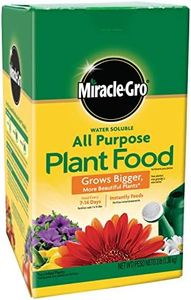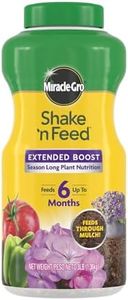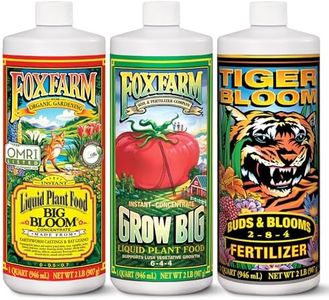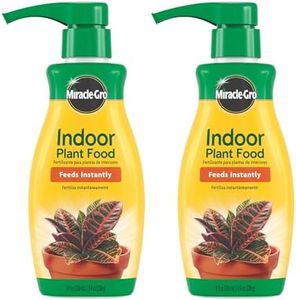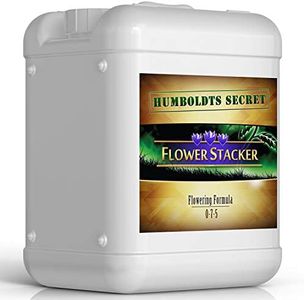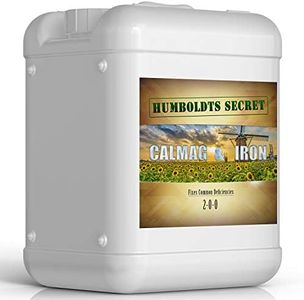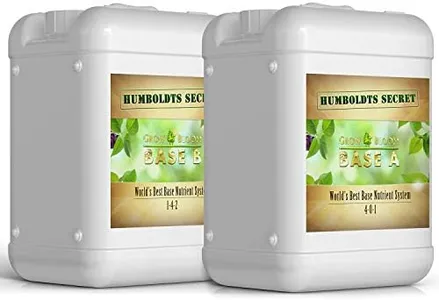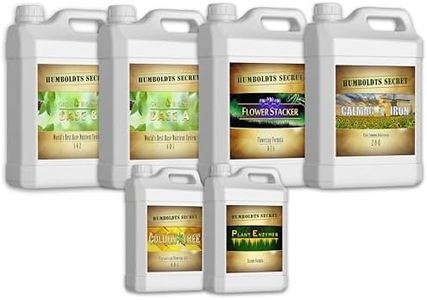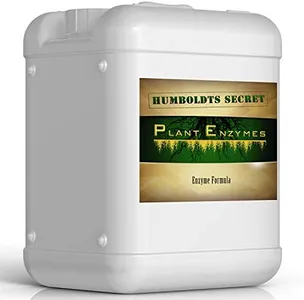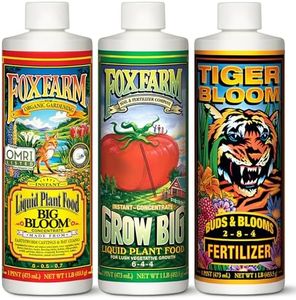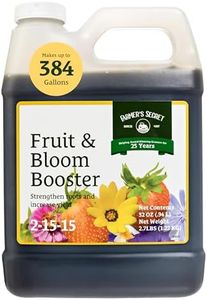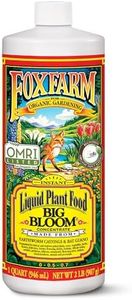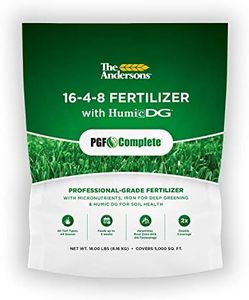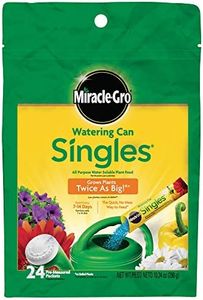10 Best fertilizers 2025 in the United States
Our technology thoroughly searches through the online shopping world, reviewing hundreds of sites. We then process and analyze this information, updating in real-time to bring you the latest top-rated products. This way, you always get the best and most current options available.

Our Top Picks
Winner
Miracle-Gro Water Soluble All Purpose Plant Food, Fertilizer for Indoor or Outdoor Flowers, Vegetables or Trees, 3 lbs.
Most important from
61949 reviews
Miracle-Gro Water Soluble All Purpose Plant Food is a versatile fertilizer suitable for a variety of plants, including flowers, vegetables, trees, shrubs, and houseplants. One of its major strengths is its ability to provide essential nutrients instantly, promoting the growth of larger and more beautiful plants compared to unfed ones.
It is very user-friendly, as it can be applied every 1-2 weeks using either the Miracle-Gro Garden Feeder or any standard watering can. This makes the application process straightforward and convenient for both indoor and outdoor gardening. Additionally, it's safe to use on all plants and comes with a guarantee that it won't burn them when used as directed, which provides peace of mind for users concerned about over-fertilization.
Miracle-Gro Water Soluble All Purpose Plant Food is a highly effective fertilizer that is particularly well-suited for general use in both indoor and outdoor gardens, although it may not meet the needs of those specifically seeking organic products or highly specific nutrient formulations.
Most important from
61949 reviews
Miracle-Gro Shake 'n Feed Extended Boost, Fertilizer for Plants, Feeds Up to 6 Months, 3 lbs.
Most important from
15599 reviews
Miracle-Gro Shake 'n Feed Extended Boost is a versatile granular fertilizer that offers long-lasting nutrition for up to 6 months, making it a convenient choice for busy gardeners. It is designed for use with a wide variety of plants, including flowers, vegetables, and even container plants, which adds to its appeal for those with diverse gardening needs.
A significant strength of this product is its ability to feed plants even through mulch, which can be particularly beneficial for maintaining consistent nutrient supply in mulched gardens. The application method is straightforward—simply shake the granules over your garden area and water them in, covering up to 111 square feet per 3-pound container. This ease of use makes it accessible for gardeners of all experience levels.
The fertilizer's NPK ratio of 5:5:10 indicates a balanced mix of nutrients, slightly favoring potassium to promote strong root development and plant health. However, those seeking a higher nitrogen content for lush foliage might find this ratio less ideal. The product doesn't specifically mention additional micronutrients or soil pH compatibility, which could be a consideration for users with specific soil conditions or nutrient requirements.
While the product is synthetic, which appeals to users looking for consistent and predictable results, it may not be the best choice for those committed to organic gardening practices. Despite this, it remains a practical choice for gardeners looking for an easy-to-use, long-lasting fertilizer that supports a wide range of plant types. Its balanced nutrient profile and straightforward application make it a solid option, though users should consider their specific gardening goals and preferences when deciding if it's the right fit for their needs.
Most important from
15599 reviews
Osmocote Smart-Release Plant Food Plus Outdoor & Indoor, 8 lb.
Most important from
25926 reviews
Osmocote Smart-Release Plant Food Plus is a versatile fertilizer designed for both indoor and outdoor plants. With an NPK ratio of 15-9-12, it offers a balanced mix of nitrogen, phosphorus, and potassium, essential for plant growth. It also contains 11 essential nutrients, making it suitable for most types of plants and growing conditions, whether in containers or in-ground gardens. The granules are formulated to feed plants for up to six months, which reduces the need for frequent reapplication.
This fertilizer is synthetic, which means it provides consistent and immediate nutrients to plants. It is easy to apply by sprinkling and mixing into the soil, followed by regular watering. The 8 lb. container covers a substantial area of approximately 300 sq. ft., making it both cost-effective and convenient for larger gardens. On the downside, as a synthetic fertilizer, it may not be suitable for those looking for an organic option. Additionally, users need to reapply every six months, which might be less convenient compared to some long-lasting organic fertilizers.
Osmocote Smart-Release Plant Food Plus is a reliable choice for gardeners looking for a long-lasting, nutrient-rich fertilizer suitable for a wide variety of plants.
Most important from
25926 reviews
Buying Guide for the Best fertilizers
Choosing the right fertilizer for your plants can significantly impact their growth and health. Fertilizers provide essential nutrients that plants need to thrive, and selecting the right one involves understanding your plants' specific needs and the characteristics of different fertilizers. Here are some key specifications to consider when choosing a fertilizer, along with explanations to help you make an informed decision.FAQ
Most Popular Categories Right Now
